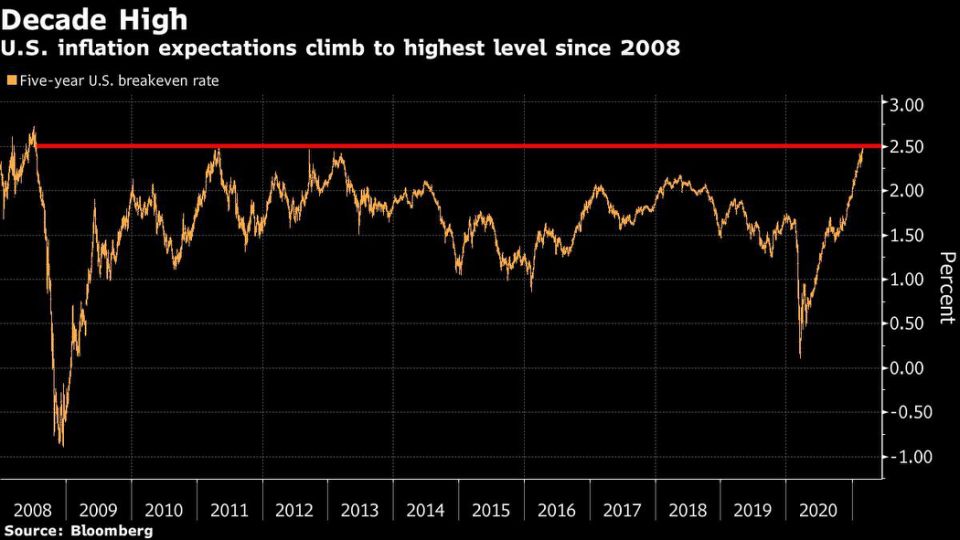
U.S. Treasuries tumbled anew on Wednesday, driving long-maturity yields to their highest levels this week and pushing up inflation expectations as traders continued to price in a quicker economic rebound from the pandemic.
Benchmark 10-year Treasury yields surged as much as 10.3 basis points to 1.495%, a move reminiscent of last Thursday’s startling selloff in government debt. Meanwhile, a market proxy for the anticipated annual inflation rate for the next half-decade exceeded 2.5% for the first time since 2008 — aided by climbing oil prices. At least part of the trigger for the fixed-income losses came from the U.K., which said it will sell more bonds than expected as its economy emerges from a deep recession.
Also in the background was Joe Biden’s announcement that enough doses of virus vaccine should be available to every American adult by the end of May, and a report Wednesday that the president would moderate certain stimulus demands to try to win support for his virus-relief bill. Rising yields have started to draw the attention of Federal Reserve officials, leaving all eyes on an appearance Thursday by Chair Jerome Powell.
Among other things, “the stimulus package is likely to go through and the economy is reopening,” said Michael Franzese, managing partner at MCAP LLC in New York. “The battle is on between rates going higher super-fast and a Federal Reserve that’s trying to keep the market stable and may try to slow the momentum of the reflation and economic-rebound trade into something more manageable.”
Early inklings of inflation were evident in data from the Institute for Supply Management this week: Measures of prices paid jumped to their highest levels since 2008.
A large trade on Wednesday in 10-year Treasury options and accompanying futures selling also fueled the leap in yields, as did heavy corporate bond supply.
The rates market is not yet done fully pricing in robust U.S. economic growth, which would entail a 10-year yield trading around 1.90%, said Mark Heppenstall, chief investment officer of Penn Mutual Asset Management in Horsham, Pennsylvania. That’s the level last seen in January 2020, two months before pandemic fears started prompting forced shutdowns in the U.S.
Beyond rising nominal and breakeven rates, “the dynamic rise in the 10-year real, inflation-adjusted yield we’ve seen is the market partly adjusting to a faster-than-anticipated pace of rate normalization by the Fed,” he said.
The timing of the Fed’s first rate hike, known as liftoff, and subsequent rate hikes haven’t been factored in, making Treasuries vulnerable to a further selloff in the weeks ahead, according to Heppenstall.